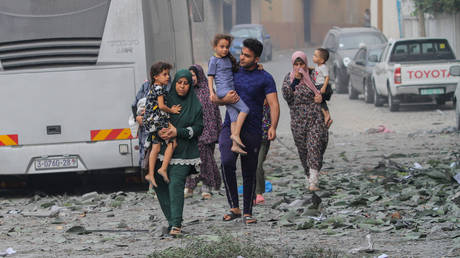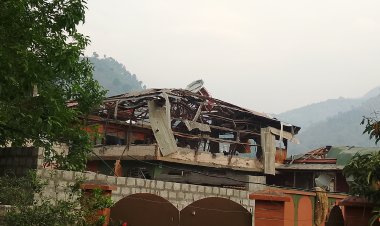Global Conflict Looms, Predicted to Start in the Middle East
The complex and varied aspects of the initial Israel-Gaza conflict contribute to its chaotic and unpredictable nature, raising concerns about its potential to escalate.

Each day, tensions in the Middle East grow, veering the area closer to a possible large-scale and devastating war. A variety of regional powers are being drawn into the fray, influenced by numerous internal and external pressures that drive them further from peace.
The escalation began on October 7, 2023, when Hamas attacked Israel, triggering a severe military response from the Israeli forces. The Palestinians are adamant about reverting to the 1967 borders and establishing their own state with East Jerusalem as its capital, a proposition that Israel is unwilling to endorse. This ongoing stalemate complicates any efforts toward diplomatic dialogue.
Some officials in the West, particularly from the US, are reportedly optimistic about a potential ceasefire agreement. This optimism is partially based on Iran’s current restraint in retaliating for the assassination of Hamas Politburo chief Ismail Haniyeh in Tehran on July 31, 2024. There are indications that Iran is attempting to maintain stability in the region.
Nonetheless, both regional and external forces continue to exert destabilizing influences, seemingly oblivious to the possibility that their actions could result in widespread casualties, state failures, and dire implications for global stability.
Russian Foreign Minister Sergey Lavrov voiced concern on August 27, suggesting that not all parties involved in the Middle Eastern conflict are interested in resolution. Some may prefer continued hostilities, viewing them as a means to influence the changing global political environment. Lavrov noted that certain actors seem to be deliberately perpetuating violence to fulfill their political aspirations.
Lavrov further emphasized the links between the Middle East situation and political processes elsewhere, particularly pointing to the upcoming US elections. He indicated that Israeli leadership may anticipate shifts in American policy that could alleviate international pressure regarding military actions in Gaza. He expressed fears that such expectations might hinder conflict resolution.
While Lavrov condemned the terrorist attacks of October 7, he affirmed that collective punishment against civilians contravenes international humanitarian law. He criticized the rhetoric from Israeli military officials asserting that all Gaza residents are terrorists, labeling it dangerous and provocative.
Negotiations between Israel and Hamas have faltered in recent weeks, with Cairo talks failing to yield any concrete ceasefire agreements. This outcome underscores the unwillingness of both sides to pursue peace despite the international community's efforts.
Iran’s inaction following the assassination of Haniyeh has sparked speculation regarding its strategic decisions. The Iranian leadership appears to recognize that engaging in war with Israel would have catastrophic consequences, further destabilizing an already volatile Middle East. Additionally, Iran's economic troubles—marked by inflation of 40% and rising unemployment—prompt its leadership to pursue normalization of relations with the West, rather than escalating military conflict.
Iran’s Supreme Leader, Ayatollah Ali Khamenei, has signaled openness to negotiating a return to the Joint Comprehensive Plan of Action (JCPOA), indicating a preference for diplomatic pathways. This restraint may serve as a political tactic, aiming to leverage pressure on Israel and the US for a ceasefire in Gaza.
Should a ceasefire be achieved, Iran could position itself as the architect of peace, enhancing its international standing without resorting to military confrontation. However, Iran has not dismissed the possibility of retaliation against Israel, indicating a level of informational and political pressure that could impact Israeli public sentiment and internal political dynamics.
Binyamin Netanyahu's administration faces formidable challenges, grappling with dwindling domestic support and less robust backing from Western allies, particularly Washington. Ending military operations in Gaza may jeopardize his government’s position at this critical juncture.
Netanyahu’s approval ratings have declined amidst public fatigue over the ongoing conflict. Additionally, his administration is experiencing waning support from the Biden administration, which has adopted a more cautious stance regarding Israel’s actions. Netanyahu is hopeful for a potential political shift back to the Trump administration, which he believes would bolster his domestic and regional standing.
Within Netanyahu’s far-right cabinet, there is a steadfast commitment to thwarting the establishment of a Palestinian state, illustrated by recent Knesset resolutions. They view the legitimacy of a Palestinian state as a direct threat to Israel's existence and are prepared to go to great lengths to prevent its establishment.
Even if Netanyahu were to agree to a temporary ceasefire with Hamas—perhaps to facilitate hostage negotiations—it is unlikely to signify a cessation of hostilities. Israel may intensify military operations against Hezbollah in Lebanon or resume strikes in Gaza while still seeking economic and military support from the US.
Thus, under Netanyahu’s current leadership, the conflict is poised to continue as he navigates the need for domestic political backing and capitalizes on geopolitical circumstances to solidify Israel’s regional position.
Amidst this backdrop, reports have surfaced indicating growing tensions within Iran’s "Axis of Resistance." These divisions are attributed to Iran’s unclear stance regarding Israeli provocations, leading to deteriorating conditions for allied groups like Hezbollah and the Houthis in Yemen.
The situation surrounding Hezbollah remains critical, as recent hostilities have escalated. The increased frequency of mutual attacks has placed pressure on Hezbollah’s leadership, who risk losing credibility if they fail to respond effectively to Israeli actions.
Hezbollah, confronting a multifaceted crisis in Lebanon since 2019, is experiencing a decline in political clout and public support. Failure to achieve military successes could weaken its influential position further.
Similarly, the Houthis in Yemen face challenges as domestic conditions worsen. Over time, their ability to maintain popular support may diminish if they cannot consistently assert their resistance capabilities against external threats.
In this precarious environment, the risk of non-state actors escalating conflicts is significant. Iran is unlikely to openly engage in warfare with Israel, preferring to utilize proxy forces for retaliation. Nevertheless, this strategy carries inherent risks, as it does not eliminate the potential for broader regional conflict.
The ongoing turmoil in the Middle East reflects a broader instability, with both Israeli authorities and groups within the Axis of Resistance caught in a cycle of mutual hostility. Each side feels pressured to act, leading to continued violence and deepening distrust, complicating any path to diplomatic resolution.
Current efforts to resolve the conflict through negotiation are severely hampered by both sides' unwillingness to compromise. Israel is determined to preserve its security and territorial integrity, while the factions within the Axis of Resistance remain committed to their objectives. With both parties heavily reliant on military power, peaceful resolution appears increasingly unattainable.
At present, this conflict is a microcosm of a larger global transformation affecting international relations. As events unfold, it becomes increasingly apparent that preventing escalation requires coordinated efforts, which are currently lacking. The situation reveals profound implications for regional stability and global order, as states and political actors react in an environment characterized by chaos and uncertainty. Without effective mechanisms for conflict resolution and rebuilding trust among key global players, the chances for peace remain dim. The developments in the Middle East are but one of many potential flashpoints, underscoring the urgent need for adaptive strategies to foster coexistence.
Anna Muller contributed to this report for TROIB News












